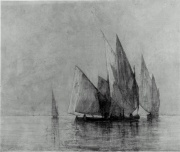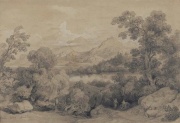Difference between revisions of "Pencil"
| Line 2: | Line 2: | ||
== Description == | == Description == | ||
| − | A tool for drawing and writing. The word pencil | + | A tool for drawing and writing. The word "pencil" is derived from the Latin word for a fine-pointed brush, ''penicillum''. It was used to describe a tool to hold a stick of dry media, such as [[chalk]], [[lead]], or [[graphite]]. The first picture showing a [[lead pencil]] appears in a 1565 woodcut as an ornate wood tube holding a tapered lead stick. The early lead pencils contained soft metallic [[lead]] points encased in [[wood]] shafts. The marks could be erased with a [[bread eraser]] or a soft [[leather]] cloth. In the mid 19th century, the [[graphite pencil]] became more popular. The shafts of graphite pencils are made from [[graphite]] mixed with [[clay]]. However, the earlier name of lead pencil transferred and, though incorrect, its use continued. Drawing pencils are available in several grades of hardness depending on the relative concentrations of clay, binder and graphite. 9H contains the most clay and is the hardest, while 6B contains little clay and is very soft. Standard writing pencils are graded on a scale of 1 (soft) to 4 (hard). |
See also [[colored pencil]], [[grease pencil]], and [[wax crayon]]. | See also [[colored pencil]], [[grease pencil]], and [[wax crayon]]. | ||
[[File:97.764-SC62796.jpg|thumb|]] | [[File:97.764-SC62796.jpg|thumb|]] | ||
| + | |||
| + | == Additional Information == | ||
| + | |||
| + | *Henry Petroski, ''The Pencil: A History of Design and Circumstance'', Alfred A. Knopf, New York, 1990. | ||
| + | |||
| + | *James Watrous, ''The Craft of Old-Master Drawings'', The University of Wisconsin Press, 1957. | ||
| + | |||
== Synonyms and Related Terms == | == Synonyms and Related Terms == | ||
Revision as of 09:12, 31 July 2014
Description
A tool for drawing and writing. The word "pencil" is derived from the Latin word for a fine-pointed brush, penicillum. It was used to describe a tool to hold a stick of dry media, such as Chalk, Lead, or Graphite. The first picture showing a Lead pencil appears in a 1565 woodcut as an ornate wood tube holding a tapered lead stick. The early lead pencils contained soft metallic Lead points encased in Wood shafts. The marks could be erased with a Bread eraser or a soft Leather cloth. In the mid 19th century, the Graphite pencil became more popular. The shafts of graphite pencils are made from Graphite mixed with Clay. However, the earlier name of lead pencil transferred and, though incorrect, its use continued. Drawing pencils are available in several grades of hardness depending on the relative concentrations of clay, binder and graphite. 9H contains the most clay and is the hardest, while 6B contains little clay and is very soft. Standard writing pencils are graded on a scale of 1 (soft) to 4 (hard).
See also Colored pencil, Grease pencil, and Wax crayon.
Additional Information
- Henry Petroski, The Pencil: A History of Design and Circumstance, Alfred A. Knopf, New York, 1990.
- James Watrous, The Craft of Old-Master Drawings, The University of Wisconsin Press, 1957.
Synonyms and Related Terms
lead pencil; graphite pencil; art pencil; colored pencil; wax pencil; grease pencil; charcoal pencil; carbon pencil; blyant (Dan., Nor.); Bleistift (Deut.); lápiz (Esp.); crayon mine (Fr.); matita (It.); potlood (Ned.); o³ówek (Pol.); lápis (Port.); blyertspenna (Sven.)
Comparisons
Websites of pastel, pencil, and marker manufacturers
Websites of pastel, pencil, and marker manufacturers
Authority
- Ralph Mayer, A Dictionary of Art Terms and Techniques, Harper and Row Publishers, New York, 1969 (also 1945 printing)
- Encyclopedia Britannica, http://www.britannica.com Comment: "Pencil." Encyclopædia Britannica. 29 Apr. 2004 .
- Wikipedia, the free encyclopedia, at http://www.wikipedia.com Comment: http://en.wikipedia.org/wiki/Pencil (Accessed Jan. 15, 2006)
- Random House, Webster's Encyclopedic Unabridged Dictionary of the English Language, Grammercy Book, New York, 1997
- The American Heritage Dictionary or Encarta, via Microsoft Bookshelf 98, Microsoft Corp., 1998

